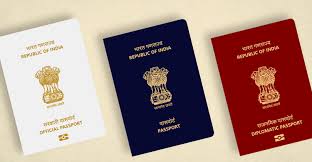Passport Online
Different Types Of Passports Available In India:
An Indian passport is more than just a travel document; it also serves as a crucial form of identity proof for Indian citizens. Issued under the Passports Act of 1967, the Indian government provides different types of passports to its citizens. But before we delve into the various types, let’s define what a passport is. In simple terms, a passport is an official document issued by a country to its citizens for international travel. It includes essential details such as the holder’s nationality, date of birth, signature, and a photograph.
The three types of passports available in India are :

Differences Between The Three Indian Passports:
(1)The Regular Indian Passport
This type of passport, known as the P-Type or Type P (where “P” stands for personal), is issued to regular citizens as well as VIPs for ordinary, personal travel. It comes in booklets containing either 36 or 60 pages and does not grant any special privileges to the holder.
(2)The Official Indian Passport
This passport is typically issued to government employees traveling on official national duty, usually to represent the country abroad. It is important to note that these passports are not issued for overseas job assignments, but solely for those traveling internationally on official state business. Additionally, these passports are issued to dependents of officials in the Indian Foreign Service (Branch A & B). The holder of an Official passport does not enjoy any special privileges.
(3)The Diplomatic Indian Passport
The Diplomatic Indian Passport is one of the most prestigious types of passports, issued to high-ranking government officials, consuls, senior members of the Indian Foreign Service traveling on duty, and their dependents. It is also granted to individuals holding diplomatic status. However, it is important to note that possessing a Diplomatic Passport does not automatically confer diplomatic immunity, as this is granted separately.
Passport Apply Procedure
Applying for a passport in India has become a straightforward process, provided you are familiar with the correct procedure. Each state has its own Passport Office, but all offices follow uniform rules set by the Central government. You can apply for a passport from any state where you currently reside, regardless of your place of origin. To avoid unnecessary hassles, it’s crucial to understand the entire process and be aware of the necessary requirements beforehand. Here’s a step-by-step guide to help simplify the process of obtaining a passport.

Now let’s go step by step as to how one can get a passport.
- Filing an application :
First you have to fill the application form which can be obtained either online or offline. Fill in all the details accurately, without any spelling mistakes and within the boxes provided for the same. Leave a box when one word or name is complete.
- Taking appointment
Register online and take an appointment. You will be given a particular date and time to appear in the passport office with your documents and application form.
- Preparing the documents
A must thing to do is keep all your documents ready to avoid last minute hassles. You will need address proof, ID proof and other supporting documents (if you cannot furnish primary documents) along with their self-attested photocopies. Affidavits or Annexures are to be properly filled, Notary-attested or Magistrate-attested and enclosed with the application form as and if necessary.
- Visit the Passport Office
On the day of appointment reach the passport office well before your scheduled time. You would be given a token number and when your number is called you will have to appear before any of the counters with all the above-mentioned documents. You would be photographed and in case you fail to produce any document or if any of the documents produced by you is found to be fake etc, then your application would get rejected.
- Police verification
Following the formalities in the Passport office, you will have to wait for the police verification which may take place within a week’s time. The policeman from your local area station would visit your home and check for your address proof and ID proof documents. You need to be present personally at your home. For any reason, if you fail to be present during the police visit, then it is advisable to visit the respective police station and submit your documents personally.
- Delivery
Once the police verification is completed you will receive a message from the passport office stating that your police verification is cleared and that you will be receiving the passport within a few days. And in a week’s time you will receive your passport.
Tatkaal Scheme
The Passport office also provides instant passports under the Tatkaal Scheme. Tatkaal scheme can be made use of in issue or reissue of passport. This is a convenient way to get a passport under emergency situations like death or serious conditions of any near or dear ones. However, one cannot avail Tatkaal scheme under the following circumstances:
- for lost and damaged passports
- scheduled travel plans
- expired visa status
- passports not renewed for more than 6 months
- Tatkaal passports are processed under post police verification. The print queue is different and hence the printing and dispatching of Tatkaal passports are done within 1 to 3 days from the date of applying.
Passport For Minor Children
Passport for minor children can be applied by their parents or guardian. Usually it is assumed that both parents have consented to the applying of passport unless otherwise specified. In case of no consent from any one of the parents, there are certain Annexures which need to be attached with the application form.
- Document for address proof can be the parent’s address proof document for the minor.
- If parents possess passport(s), then the original and self-attested copies of the passport should to be produced.
- Parents can attest the documents for the minor. Minor applicants are eligible for Non ECR (Emigration check not required).
Renewal Of Passport
A passport in India is valid for 10 years from the date of issue. A person can renew his passport before 1 year from the date of expiry or within 1 year after the expiry date.
The expiration date is denoted as Final or F after the expiration date. Once a new passport is issued to the applicant, the old passport is cancelled and returned to the applicant. But if there are any pending valid visa, then the passport will continue to be valid until the expiration date of the visa.
For instance, a person possessing a passport with 20 years validity, has to apply for a fresh passport before expiration and not Re-issue. He/she should select the option ‘Fresh Passport’ in the application form.
Damaged Or Lost Passport
A passport may be damaged in two ways-
- Passport number is readable, name and photo are clear
- Passport damaged beyond recognition
If a passport gets damaged then one has to apply for Re-issue of Passport along with Annexure-L. The various documents to be attached with the application form for re-issue of passport include address proof, ID proof, 4-5 photos, explanation letter as to how and when the passport got damaged and Annexure-L.
There is no need to lodge a police complaint for a damaged passport.
If your passport is lost, then you have to immediately lodge a complaint with the nearest police station and get an FIR copy. In this case, while submitting the application for re-issue of passport, you will have to attach the complaint copy, FIR, along with the other documents mentioned in the case of damaged passport.
Changes in Passport
You may have got your passport in a particular name or address or date of birth or father’s name etc., but later you may want to make changes in any of these for various reasons like: change of name after marriage for women General change of name due to spelling mistake or numerology or having more than two names etc. change of address change in any dates like date of birth, date of marriage etc. change in status of the applicant like divorcee, widow, etc. change in father’s name, spouse name etc. For any further information on about Certificate Attestation, Embassy Attestation application for Certificate Attestation, procedure to be followed Certificate Attestation and submission Certificate Attestation you can contact us

